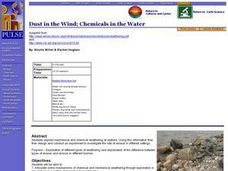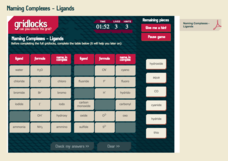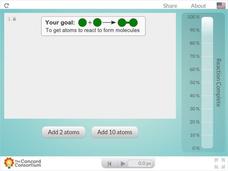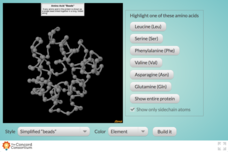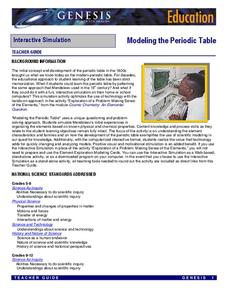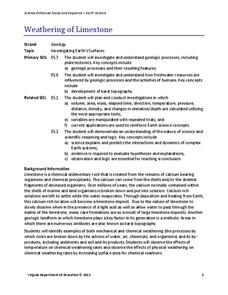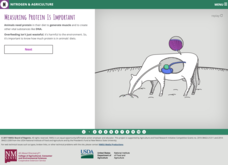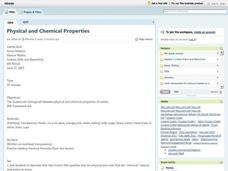Curated OER
Dust in the Wind; Chemicals in the Water
High schoolers explore mechanical and chemical weathering at stations. They articulate some mechanisms of chemical and mechanical weathering through exploration in a lab. Students stations describe how chemical weathering differs from...
Curated OER
Chemquest: Physical Changes or Chemical Reactions
Students explore physical and chemical changes. In this chemistry lesson plan, students will go outside to observe changes seen in nature. Students will then work in the lab to identify changes at different stations prior to doing a...
Curated OER
Interactive Quiz 2
In this chemistry interactive quiz, students answer 15 multiple choice questions on chemical bonding, enthalpy and Lewis structures.
Royal Society of Chemistry
Naming Complexes—Ligands
Naming complexes can be, well, pretty complex! Simplify a study of ligands using interactive puzzles. Junior chemists match up the name, formula, and complex name, then solve a series of logic games with the information.
Concord Consortium
Concentration and Reaction Rate
Does concentration affect the rate of a chemical reaction? Science scholars observe and control a chemical reaction in an interactive simulation. The resource allows pupils to add atoms to the reaction vessel and monitor the reaction's...
CK-12 Foundation
Balancing Equations
Make the microscopic world of chemical reactions come to life. An engaging video demonstrates a methane-oxygen reaction. Learners see the reaction take place and observe the chemical equation being balanced.
Concord Consortium
Breaking a Molecular Bond
Breaking up is hard, especially with a third part involved! Watch as molecules of hydrogen, oxygen, and nitrogen try to keep it together as a neutral third atom bombards them. Users control the reactive molecules and the velocity of the...
Concord Consortium
Exploring Protein 3D Structure
Presenting protein structure can be difficult! Take young biologists on a 3-D amino acid adventure with a detailed interactive. Pupils view and manipulate common amino acids individually or as a part of a whole protein. Choose from three...
Scholastic
Study Jams! Energy & Matter
After Sam knocks a glass off the lunchroom table, he uses it as a springboard for explaining kinetic and potential energy. He mentions that sound is a type of kinetic energy and introduces the different forms of energy: thermal,...
CK-12 Foundation
Hotpack - Coldpack
Chemistry can help athletes and others protect and treat injuries. Use the interactive activity to explore the chemical reactions in instant hot and coldpacks. Learners manipulate the type of salt in the pack and watch the reaction take...
Concord Consortium
Polymers and Monomers
You don't want to break these chains! Show young chemists and biologists the basics of polymerization with a simple interactive. The resource gives learners three types of polymers to experiment with, as well as a brief tutorial about...
Curated OER
Digestive System (Online Interactive)
In this digestive system activity, students read a 7 paragraph text to learn the functions of the digestive system. Students then answer 10 multiple choice questions. This is an online interactive activity.
Curated OER
The Effects of Temperature on Chemical Mixtures
Learners explore chemical cahnges and the effect of temperature on chemical mixturees, They make observations of the behavior and appearance of certain chemical mixtures and reactions.
Cornell University
Unknown Powders
Create a little scientific magic within your classroom! Learners mix powders and liquids and identify chemical reactions. Based on the reactions, individuals determine the identity of various powders.
NASA
Modeling the Periodic Table
Imagine a race to complete a puzzle where each person has the same 50 pieces, knows they are missing other pieces, and must figure out how everything fits together. The winner gets fame, listed in books for years to come, and a financial...
Virginia Department of Education
Weathering of Limestone
We all know limestone weathers, but what affects the rate of weathering? Young scientists investigate the physical and chemical weathering of limestone (chalk) through experimentation. First, they conduct trials with different-size...
Curated OER
The High Cost of Chemical Dependency
Sixth graders explore, analyze and study the effect and impact that humans have on the environment based on their choices as individuals, businesses and governments. They assess the balance between human activities and aquatic pollution.
Royal Society of Chemistry
Testing for Gases
If most gases are invisible, how do we know so much about them? Pupils practice associating the name, formula, testing method, and outcome for four common gases using an interactive. Users build on the content of their first puzzles to...
Jefferson Lab
The Periodic Table of Elements
A study of the periodic table of elements doesn't have to be elementary! Deepen understanding of the building blocks of chemistry with an interactive periodic table. At first sight, the table looks like a standard reference page, but a...
Learning Games Lab
Nitrogen in Feed
Knowing what farmers are feeding livestock is just smart business. A WebQuest lesson helps learners build an understanding of the relationship between amino acids, nitrogen, and protein. With interactive instruction,...
Curated OER
Chemical Changes
Eighth graders observe two types of interactions in a sealed plastic bag. One bag contains baking soda and water, and the other baking soda and vinegar. They determine what evidence indicates that a chemical change is occurring.
Curated OER
Physical and Chemical Properties
Students study the difference between physical and chemical properties. They also discuss changes in matter, known as physical and chemical changes. They observe and discuss several demonstrations of both physical and chemical changes
Curated OER
Chemical Weathering
Pupils measure the effect of water temperature on the rate of a chemical reaction, similar to the interaction of a weak acid and carbonate rock, using hot water and effervescent antacid tablets.
Curated OER
Chemistry World The Five Types of Chemical Reactions
Students research five types of chemical reactions in order to design a learning center. Students use technology to research and present their material.
